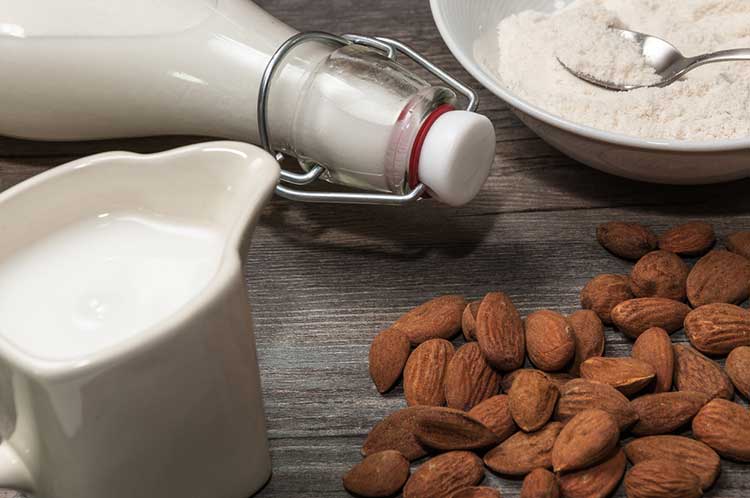Almond milk has become a dairy-free alternative to traditional cow’s milk. But Can You Freeze Almond Milk?
It is made by blending almonds with water and straining the mixture to remove solids. Many people wonder if it is possible to freeze almond milk to extend its shelf life or to have it readily available whenever needed. In this article, we will explore whether freezing almond milk is viable and discuss its potential effects on its taste, texture, and overall quality.
What Is Almond Milk?
Almond milk is a plant-based alternative to dairy milk made by blending almonds with water and then straining the mixture to remove any solids. It has a creamy texture and a slightly nutty flavor, making it a popular choice for those who are lactose intolerant, have dairy allergies, or follow a vegan or plant-based diet. Almond milk is also low in calories and contains no cholesterol or saturated fat. It can be used as a substitute for dairy milk in various recipes, such as smoothies, baked goods, and coffee beverages.
Should You Freeze Almond Milk?
It is a significant concern, but you should not freeze almond milk. Freezing almond milk can cause it to separate and change in texture, resulting in a grainy or watery consistency when thawed. Additionally, freezing can affect the taste of almond milk, making it less enjoyable to consume. It is recommended to use almond milk within its expiration date and store it properly in the refrigerator to maintain its quality.
Benefits Of Freezing Almond Milk

Freezing almond milk can offer several benefits.
- Freezing almond milk can significantly extend its shelf life. While refrigerated almond milk typically lasts about 7-10 days, frozen almond milk can last up to 3 months or even longer if stored properly.
- Freezing almond milk gives you a readily available supply whenever you need it. You can freeze it in small portions, making it easy to thaw and use as required.
- By freezing almond milk, you can prevent it from going bad before you have a chance to consume it. This helps reduce food waste and saves money.
- Buying almond milk in bulk and freezing it can be more cost-effective than purchasing smaller quantities frequently. It allows you to take advantage of sales or discounts without worrying about the product expiring.
- Frozen almond milk can be used in various recipes, including smoothies, baked goods, soups, and sauces. It retains its nutritional value and flavor when thawed and used in cooking or blending.
How To Freeze Almond Milk?
Freezing almond milk is a simple process that can help extend its shelf life and prevent wastage. Almond milk is a popular dairy-free alternative to cow’s milk, and freezing it can be convenient for having it on hand whenever needed. However, it’s important to note that freezing almond milk may cause some changes in its texture and consistency. Nevertheless, by following the proper steps, you can successfully freeze almond milk without compromising its taste or quality.
Here is a step-by-step guide on how to freeze almond milk:
- Before freezing almond milk, check the expiration date on the packaging. Freezing almond milk is best done before the expiration date to ensure optimal freshness.
- Select a suitable container for freezing almond milk. It’s recommended to use an airtight container or freezer-safe plastic bag. Ensure the container has enough space for expansion as the liquid expands when frozen.
- Pour the almond milk into the chosen container, leaving some space at the top for expansion. If using a plastic bag, squeeze out any excess air before sealing it tightly.
- Label the container with the current date and indicate that it contains frozen almond milk. This will help you keep track of its storage time and prevent confusion in your freezer.
- Place the container in the freezer, storing it upright to prevent leakage or spills. It’s advisable to place it on a flat surface until it is completely frozen.
- When ready to use the frozen almond milk, transfer it from the freezer to the refrigerator and allow it to thaw slowly overnight or for about 24 hours. Avoid melting at room temperature or using heat sources, as this can affect the quality of the milk.
- After thawing, give the almond milk a good shake to redistribute any separated solids and ensure a smooth consistency.
- Once thawed, consuming the almond milk within a few days is essential. The texture and taste may slightly change after freezing, so it’s best to use it in recipes or as a beverage rather than consuming it directly.
Can You Freeze Almond Milk In The Carton?

Yes, you can freeze almond milk in the carton. Freezing almond milk is a convenient way to extend its shelf life and prevent it from worsening. However, it is essential to note that freezing may cause some separation and texture changes in the milk. To freeze almond milk, ensure enough space in the carton for expansion, as liquids expand when frozen. Giving the carton a gentle shake before using the thawed almond milk is also recommended to help redistribute any separated solids. Additionally, consuming thawed almond milk within a few days after defrosting is advisable. Not all almond milk brands may freeze well, so it is always best to check the manufacturer’s instructions or website for specific freezing guidelines.
How Long Does Almond Milk Last In The Freezer?
Almond milk can be stored in the freezer for up to 3 months. Freezing almond milk helps to extend its shelf life and maintain its quality. However, it is essential to note that the texture and taste of almond milk may slightly change after being frozen. When freezing almond milk, transferring it into an airtight container or freezer-safe bag is recommended, leaving some room for expansion. Before using the frozen almond milk, it should be thawed in the refrigerator overnight. Once melted, give it a good shake or stir before consuming. It is not advisable to refreeze almond milk after it has been thawed.
Can You Refreeze Almond Milk?
Yes, you can refreeze almond milk. However, it is essential to note that the texture and consistency of the milk may change after being frozen and thawed. When freezing almond milk, transferring it into an airtight container is recommended, leaving some space for expansion. Thawing should be done in the refrigerator overnight, and once thawed, the milk should be shaken well before use. Repeated freezing and thawing can further alter the quality of almond milk, so it is advisable only to freeze it once if possible.
How To Defrost Frozen Almond Milk?
Transfer the container from the freezer to the refrigerator to defrost frozen almond milk. Allow it to thaw slowly for several hours or overnight. Once completely melted, give the almond milk a good shake or stir to ensure it is well mixed before using. Avoid using heat or microwaving, as it can alter the texture and taste of the milk. It is important to note that freezing almond milk may cause some separation, so thoroughly mixing it after thawing is essential for a smooth consistency.
How To Thaw Almond Milk?
To thaw almond milk, transfer the frozen almond milk from the freezer to the refrigerator and let it thaw overnight. It is important not to thaw almond milk at room temperature or using heat, as this can affect its taste and texture. Once melted, give the almond milk a good shake before using it to ensure it is well-mixed.
How To Use Thawed Almond Milk?
If you want to know if you can drink thawed almond milk or how to use it, give it a good shake to ensure it is well-mixed. You can then use it in various ways, such as adding it to your morning cereal or oatmeal as a substitute for regular milk in recipes or blending it into smoothies. Thawed almond milk can also be used to make frozen almond milk cubes or in coffee or tea as a dairy-free alternative. It is important to note that the texture of thawed almond milk may be slightly different from fresh almond milk, but it should still be safe to consume.
Potential Risks With Freezing Almond Milk
Freezing almond milk can be a convenient way to extend its shelf life and ensure it doesn’t go to waste. However, there are potential risks associated with freezing almond milk that should be considered.
Texture and Consistency Changes
One of the main risks of freezing almond milk is that it can alter the texture and consistency of the milk. Freezing can cause the liquid to separate, resulting in a grainy or clumpy texture when thawed. This can make the almond milk less enjoyable and affect its recipe usability.
Flavor Changes
Another potential risk of freezing almond milk is that it can impact its flavor. Freezing can cause the natural oils in almond milk to separate, leading to a change in taste. The frozen and thawed almond milk may have a slightly different flavor than fresh almond milk.
Nutrient Loss
Freezing almond milk may also result in some nutrient loss. While most nutrients remain relatively stable during freezing, there may be a slight decrease in specific vitamins and minerals. This is because freezing can cause some degradation of nutrients over time.
FAQs
How Long Can You Freeze Almond Milk?
Almond milk can be frozen for up to 3 months without significant changes in taste or texture. However, it is essential to note that the consistency may slightly alter after thawing.
Does Almond Milk Yogurt Freeze Well?
Almond milk yogurt can be frozen, but the texture may change slightly upon thawing. Stirring the yogurt well after thawing is recommended to restore its creamy consistency.
What About Homemade Almond Milk?
Homemade almond milk can be frozen, but it may undergo some changes in texture and separation upon thawing. Shaking or stirring the thawed almond milk before using it is recommended.
When To Freeze Almond Milk?
Almond milk can be frozen when it is nearing its expiration date or when you have an excess amount you won’t be able to consume in time.
Does Almond Milk Freeze Well?
Almond milk can be frozen, but it may change texture and consistency upon thawing. Giving the frozen almond milk a good shake or stirring before using it is recommended.
Can You Freeze Almond Milk For Smoothies?
Yes, almond milk can be frozen for smoothies. However, it is essential to note that the texture and consistency of the almond milk may change after freezing and thawing. Giving the thawed almond milk a good shake or stirring before using it in smoothies is recommended.
Conclusion
In conclusion, it is possible to freeze almond milk, but some significant considerations must be remembered. Freezing almond milk can alter its texture and taste, so it may not be suitable for all uses after thawing. However, if you plan to use frozen almond milk in smoothies or recipes with less critical textures, freezing can be a convenient option for extending its shelf life.





![Can You Freeze Dates? - [ Best Freezing Guide ] Can You Freeze Dates](https://juicerhunter.com/wp-content/uploads/2023/09/Can-You-Freeze-Dates-150x150.webp)
